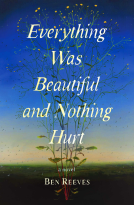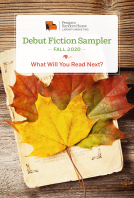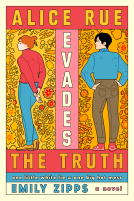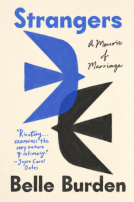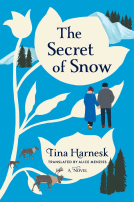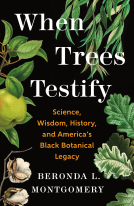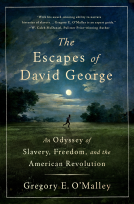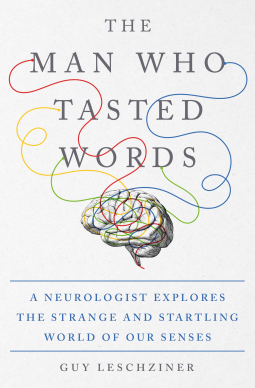
The Man Who Tasted Words
A Neurologist Explores the Strange and Startling World of Our Senses
by Dr. Guy Leschziner
This title was previously available on NetGalley and is now archived.
Send NetGalley books directly to your Kindle or Kindle app
1
To read on a Kindle or Kindle app, please add kindle@netgalley.com as an approved email address to receive files in your Amazon account. Click here for step-by-step instructions.
2
Also find your Kindle email address within your Amazon account, and enter it here.
Pub Date Feb 22 2022 | Archive Date Mar 08 2022
Description
In The Man Who Tasted Words, Guy Leschziner leads readers through the senses and how, through them, our brain understands or misunderstands the world around us.
Vision, hearing, taste, smell, and touch are what we rely on to perceive the reality of our world. Our senses are the conduits that bring us the scent of a freshly brewed cup of coffee or the notes of a favorite song suddenly playing on the radio. But are they really that reliable? The Man Who Tasted Words shows that what we perceive to be absolute truths of the world around us is actually a complex internal reconstruction by our minds and nervous systems. The translation into experiences with conscious meaning—the pattern of light and dark on the retina that is transformed into the face of a loved one, for instance—is a process that is invisible, undetected by ourselves and, in most cases, completely out of our control.
In The Man Who Tasted Words, neurologist Guy Leschziner explores how our nervous systems define our worlds and how we can, in fact, be victims of falsehoods perpetrated by our own brains. In his moving and lyrical chronicles of lives turned upside down by a disruption in one or more of their five senses, he introduces readers to extraordinary individuals, like one man who actually “tasted” words, and shows us how sensory disruptions like that have played havoc, not only with their view of the world, but with their relationships as well. The cases Leschziner shares in The Man Who Tasted Words are extreme, but they are also human, and teach us how our lives and what we perceive as reality are both ultimately defined by the complexities of our nervous systems.
Available Editions
| EDITION | Other Format |
| ISBN | 9781250272362 |
| PRICE | $28.99 (USD) |
| PAGES | 320 |
Average rating from 28 members
Featured Reviews
Fascinating, exciting, wonderous, WOW! The author does a great job at telling how the 5 senses create our reality and if one of the senses is off-kilter it will/could be disastrous.
I was fascinated with the stories, Paul and his no feeling of pain really made me stop and think about what it would really be like to not feel pain.
The seeing of colors while playing music, I felt like I was in a garden.
The toxin poisoning making the lady feel the opposite of hot and cold was fascinating.
There is so much that we don't know still about the human body.
I felt that the author did a great job at telling the stories, relating how it applies to the real world and even geeking out (seeing as how the author is a Doctor this is understandable) with medical terminology.
This is a must read book for anyone curious about our senses and how we perceive the world.
 Matt K, Reviewer
Matt K, Reviewer
A superb book for anyone who’s interested in how our brains work and how this affects our perception of reality. We’re taught that there’s a real world out there, and our five senses feed information to the brain that tells us what it is. Turns out, that’s all wrong. For a start, there are a lot more than five senses. Second, the senses feed a tiny fraction of the available information to the brain, and the brain just kind of guesses at the rest. And third, the brain doesn’t just passively accept information, it feeds back predictions to the senses on what it expects to see. (And, perhaps most fascinating of all, it calls into question whether there even is such a thing as objective reality - who’s to say one brain’s model of the world is more or less accurate than somebody else’s, or whether they’re actually the same?)
This has some important implications. When the sensory system is damaged, either by genetic mutation, physical injury, neurochemical imbalance, or whatever, the information it sends can be inaccurate, incomplete, or unreliable. So the brain fills in the rest, based on faulty data. And sometimes, it gets it very, very wrong. So you get people whose senses are completely mixed up - they perceive tastes or colors associated with vision or sound (synesthesia), or they can’t perceive objects in part of their field of view but they can tell if they’re moving. If you’ve read The Man Who Mistook His Wife For A Hat, you’ll be familiar with this kind of thing.
Leschziner, a consultant neurologist in London, digs into dozens of case histories to illustrate how different people perceive the world differently. His style is very easy to read, and always entertaining, but informative and packed with valuable information.
Highly recommended.
(Note: I received a free pre-release copy from the publisher. Illustrations were not included.)
 Reviewer 691254
Reviewer 691254
Amazing! This story is great for anyone that is interested how the brain works! Highly recommend to everyone
A very good book for those that want to know more about how we experience the world but still simply enough for those with out a degree
 Victoria I, Media/Journalist
Victoria I, Media/Journalist
Imagine that you felt no pain whatsoever. While yes, you could do things like jump off buildings and not feel it, think about all the compound fractures and other nightmares to the body that you'd endure, without knowing about it. In the new book The Man Who Tasted Words, Dr. Guy Leschziner explores the nervous system and talks about how our neurological structures work, and how sometimes they can cause us to believe fake things about the world around us.
The title references the case of a man who had a type of synesthesia which causes him to actually taste words. This can happen when our brains cross wires. He discusses the case of a family where all the children developed normally, save for pain receptors, and the nightmare it was for their parents. I still can vividly remember a passage in which the patient described breaking his own fingers in front of his parents when they denied him a snack before dinner. Dr. Leschziner's work is accessible for the casual reader, so this book doesn't feel like a slog of a textbook. It is absolutely fascinating for everyone who has wondered what life would be like without one of their senses, or one that is seemingly wired incorrectly by our nervous system.
The Man Who Tasted Words is available from St. Martin's Press on February 22, 2022.
The Man Who Tasted Words is an absolutely fascinating look into how our senses work and, sometimes, how they don't. The author is a neurologist with years of experience but he is also a talented writer - while a lot of this book is pure science, he writes about it in an easy-to-understand way and uses real-life examples of human senses acting wrong. I loved how much Leschziner managed to change my mind and make me reflect on things I considered obvious - for example, at the beginning of the book he asks the reader to rank the senses they feel are most important to living a full life. Of course, most of us would probably rank sight or hearing first, with smell and taste at the end of the list. But Leschziner proves that it's not that simple - being unable to hug your loved ones or even be in the same room as them because suddenly their smell is unbearable, or possibly losing your dream career as a sommelier because you can't taste the wine anymore are examples that we don't think about often, but that happened in real life.
I struggle a lot with health anxiety so this book was at times scarier than any horror book I could've picked up, but it was simply so captivating I couldn't stop reading. It's a perfect read for anyone who is interested and curious about how we perceive everything around us, but also wants to understand how many elements must come together for us to experience the world in the way that we do.
Wow, what a fascinating, intriguing, mind-bending book, written by an expert in the field. Definitely gives you a new perspective on the five senses. A must-read by anyone who is remotely interested in how our senses work and how it can go wrong.
Thank you to Netgalley and St. Martins Press for providing a free electronic copy of this book in exchange for an honest review. #TheManWhoTastedWords #NetGalley
This book is a fascinating read. It is a collection of stories about individuals who live with incredibly complex and unique neurological disorders. A young woman sees colours whenever she hears music where the colours change as the style of music changes. A young man learning to live with Asymbolia, never experiencing physical pain but having to live with the repercussions of having broken every bone in his body. We read about the Riddoch phenomenon, Ciguatera Toxicity, Synaesthesia, Aphantasia, and the terrifying Carles Bonnet syndrome. Leschziner makes the biology of it all very approachable for those of us who are in no way schooled in science. The stories of each of his patients are written with empathy and compassion, truly humanizing each person’s experience. I love the way the author leads into each story with an anecdote from his childhood or from medical school thus personalizing the material rather than presenting it as a textbook.
Admiringly, the author honours the idea that we are all intricately unique and that “essentially our brains work as guessing machines, interpreting what’s coming in through our senses in the context of our model of the world. What we perceive relates to our existing beliefs about the world…”
This is a fascinating book for everyone to read, not just for the science behind neurology but also for the strength portrayed in each of the patients whose stories fill the pages.
 Reviewer 816765
Reviewer 816765
Leschziner is a neurologist who explores sensual and perceptual anomalies: the sight, touch, smell, taste, and hearing kind. He interviews people about their experience, highlighting the fact, eventually, that we all have our own unique reference points.
.
Devoured this book. Would buy this book!
 Educator 761784
Educator 761784
Thank you for the opportunity to read and review this book. I learned many things while reading this. I find reading about interesting medical occurrences. There are many ways that the five senses can alter your reality. This book will make you ask the question, Is what I think of as reality really the truth?
The author chooses interesting case studies to highlight various neurological oddities. He writes about his patients kindly and relates their conditions to how they affect their everyday lives.
 kATHLEEN G, Reviewer
kATHLEEN G, Reviewer
This is an accessible and highly readable book about, well, the five senses and what happens when one of them (or more) is compromised. The anecdotes to support the arguments Leschziner presents make this shine and kept me turning the pages. Synethesia might be familiar but imagine developing gruesome hallucinations after losing your sight. Fascinating stuff well presented. Thanks to Netgalley for the ARC. An illuminating and educational read.
 Kathleen D, Reviewer
Kathleen D, Reviewer
𝐂𝐨𝐧𝐬𝐢𝐝𝐞𝐫 𝐲𝐨𝐮𝐫 𝐟𝐢𝐯𝐞 𝐬𝐞𝐧𝐬𝐞𝐬. 𝐏𝐥𝐚𝐜𝐞 𝐭𝐡𝐞𝐦 𝐢𝐧 𝐨𝐫𝐝𝐞𝐫- 𝐚𝐭 𝐭𝐡𝐞 𝐭𝐨𝐩 𝐩𝐮𝐭 𝐭𝐡𝐞 𝐬𝐞𝐧𝐬𝐞 𝐲𝐨𝐮 𝐜𝐨𝐮𝐥𝐝 𝐧𝐨𝐭 𝐬𝐮𝐫𝐯𝐢𝐯𝐞 𝐰𝐢𝐭𝐡𝐨𝐮𝐭, 𝐚𝐭 𝐭𝐡𝐞 𝐛𝐨𝐭𝐭𝐨𝐦 𝐭𝐡𝐞 𝐨𝐧𝐞 𝐲𝐨𝐮 𝐰𝐨𝐮𝐥𝐝 𝐬𝐚𝐜𝐫𝐢𝐟𝐢𝐜𝐞 𝐟𝐢𝐫𝐬𝐭.
It’s an interesting thing to consider, what sense you would give up. Personally, I would like to keep all of mine. This is a fascinating, intelligent study of the senses. My interest in neurology has been born of neurological disorders in my own family, including my meningioma, which can be a terrifying reality. I know all too well about not being able to function after a severe migraine episode, one that had me behaving as if I was having a stroke. I also have always been drawn to the subject of mental health, how our brains are wired. The most amazing truth I take away from this book is that people are incredible and resilient, some of the patient stories are uplifting and others crushing, devastating. As stated within these pages, “As ever in the world of neurology, it is through understanding the system when it goes wrong that we gain insight into normal functions.” Those of us whose systems have crashed realize how vital every single function is and thank our lucky stars there are people out there looking for answers.
It’s fascinating to me how our nervous system runs much of our lives, how we rely on all of our senses for survival, they keep us safe from danger, give us warnings about our own health. No one wants to feel pain, but what would we do without it? Not feeling pain isn’t quite the superpower one would suppose it to be. We experience the world with our senses and losing even one can upend our lives. The senses are tied up in memories from birth, what we taste, touch, smell, see, hear. Learning, we learn with our senses, don’t we? What about the state of our mind, how our emotions alter our senses? How can that be? There is a reason they say the mind is a powerful thing, that it can change our reality. Why do depressed people often have dampened senses? How can someone taste words or see without eyes? Why do people experience auditory hallucinations, even after hearing loss? How does our brain process certain information and know what to discard? How can we trust our senses when they are often deceptive?
Randomness (like accidents, injuries), genetic mutations, auto-immune diseases, seizures, blindness, strokes, loss of taste, smell, illnesses, trauma-there is no end to causes that can disrupt our senses. How is the attention that we give to them an important factor? This is a provocative read, I was pondering the senses in a different light and learning much more about the brain and the circuitry of our nervous system than I imagined. What a mystery the human body is, despite all our scientific advances. I was engrossed by the patients, the journey each was on and all that they shared with the reader. Many people are unique and present a challenge to doctors. It is through studying these deviations from the ‘norm’ that understanding expands, hope is born that help is on the horizon for so many of us. An intelligently written book.
Publication Date: February 22, 2022
St. Martin’s Press
THE MAN WHO TASTED WORDS
BY Guy Leschziner
Publisher: St. Martin's Press
Release date: February 22 2022
This is a fascinating book about the 5 sences of sight smell touch taste and hearing and how the brain effects these senses and our sense of re a reality.
He asks an interesting question from the start ...what sense could you live without if you had to choose? I first picked hearing as I'm losing my hearing now anyway. But as I read on I realized that I'm glad I chose hearing because I definitely couldn't live without the sense of touch as it is important to your place in the world.
I loved this book as he had such interesting cases to showcase his examples of what he was trying to teach us which of course made the book so readable.
If your interested in neurology or just interesting cases involving the 5 senses I highly recommend this book! It's an easy read and very informative!
Thanks to Netgalley and St Martin's Press for this advanced copy in exchange for my honest review.
 Beth F, Educator
Beth F, Educator
The Man Who Tasted Words is a fascinating exploration of brain chemistry, mechanics, and perception. Dr. Leschziner uses a variety of stories from actual case files to prompt readers to question the reality of perception and the validity of long-held assumptions about the verity of what we see, smell, feel, and hear. Packed with up-to-date research from a variety of sources, The Man Who Tasted Words manages to distill complex medical terminology into understandable and relatable facts. While reading this book, I was constantly pausing to tell my husband and children, "Hey, listen to this..."
 Reviewer 2883
Reviewer 2883
Thank you Netgalley and St. Martin's Press for access to this arc.
When I read the title of this book, I immediately thought it would be all about synesthesia. I’ve been fascinated by this alternate experience of the senses since I first read about it almost thirty years ago. Well, there is a chapter on this but the rest of the book is focused on the five to six senses that allow our brains to interpret the world around us. But this isn’t just the basic understanding of how our eyes work, or how sound waves are converted into what we hear but rather how things can be different than usual from birth or ways that changes to our bodies can distort the ways we’ve always interacted with what is outside us. Leschziner has an easy approachable writing style that makes the medical information understandable. He includes his own experiences along with case histories to illustrate each sense, speaking of his patients with compassion and understanding.
Early on Dr. Leschziner asks readers to rank senses with 1 being the sense we wouldn’t want to lose and 5 (or 6 depending on if proprioception is considered a sense) being the one we’d sacrifice if need be. I mentally arranged then rearranged my sense list. Then as the chapters and medical histories began, I started to realize that all of them are important in ways I’d never considered and most of them interact with each other in ways I’d never imagined. We all know about taste and smell being intertwined but the case histories show the amazing ways we use senses to survive and the means by which doctors and scientists are discovering how this works and how to help patients when something goes wrong.
Our brains do fantastic things every second to make sense of the vast amount of information that streams in via touch, taste, smell, sight, and hearing (and how we perceive our bodies in space). Not everything is how we think it is, though. There are compensations that the brain makes for our anatomy, information that gets filtered out so that we aren’t overwhelmed by the sheer amount of it, and so many, many ways that each person’s reality might not match anyone else’s. B
 Will B, Reviewer
Will B, Reviewer
"…sensation is not simply a process of gathering information from the periphery and funnelling it to the brain, but that actually the brain can influence the data being captured. This is referred to as bottom-up and top-down processing, respectively. But this two-way flow of information is not limited to sensation, or even our senses; it is a feature of how every tenet of our nervous system works."
--------------------------------------
"…when we listen, what we hear is the result of the process of making sense of these pressure waves all around us, ascribing meaning to these tremblings of molecules. It is an early warning system, an awareness of what lies in wait immediately beyond our bodies or outside our field of vision. It is also an effective mode of communication. As the authors of the textbook Auditory Neuroscience state, ‘Every time you talk to someone, you are effectively engaging in something that can only be described as telepathic activity, as you are effectively “beaming your thoughts into the other person’s head,” using as your medium a form of “invisible vibrations”.’"
We tend to think of our senses as pure forms of data gathering. Physical sense encounters external stimuli and transfers that information directly to the brain, where the info is incorporated. Seems simple and direct, no? It might be were it actually the case. But it is most certainly NOT the case. We know for a fact that people believe whatever they want to believe, regardless of extant reality. January 6, 2021 and your crazy, Fox-addicted uncle offer prime examples of that. But it is also the case that believing is, literally, seeing, on a much more immediate, personal, sensate level, extending far beyond the willful ignorance of political (and reportorial) bubble-think.
Dr. Guy Leschziner, a consultant neurologist in the Departments of Neurology and Sleep Disorders Centre at Guy’s and St Thomas’ Hospitals (where he runs the Sleep Disorders Centre) and at several other London institutions, presenter of several series for BBC on the brain and sleep, reports on a collection of people with unusual sensate experiences. (Sadly, none look anything like the amazing sense-connections of the characters on the fabulous TV series Sense8), If you were expecting an entire book on synesthesia, (which you might, given the somewhat misleading book title) you might have to feel that elsewhere. Yes, there is a bit of that in here, but mostly the book explores the interactions between our senses and our brains, and even considers the nature of reality as it is, versus how we might perceive it.
And if you thought the doctor would limit himself to our five senses, well, mostly, but not entirely. He does write a bit about other elements of our being that might be considered senses beyond the five. Generally, the book is about the doctor figuring out what is causing strange sensations for his patients. Case histories abound.
Mark hears his personal noises (chewing, breathing, and other) at way too high a volume, while the sounds of the external world are muffled. A TV personality has lost his ability to hear bird songs above a certain pitch, then starts hearing loud sounds everywhere, and a musical playlist that holds no appeal.
Abi can experience basic tastes, but not flavor, as she has never had a sense of smell. Leschziner riffs on the difference between the two, offering a very surprising (to me, anyway) conclusion about the latter.
There is a wonderful section on how smell impacts a wide range of human activities, including, but not limited to, the obvious ones about the edibility of food, and repulsiveness of rot, but how we make many social decisions based on an unconscious (mostly) reactions to personal odors. It certainly manifests in language. This look at olfaction passes the smell test, does not at all stink to high heaven, or smell fishy, and if called by any other name, it would smell as sweet. It is not to be sniffed at, or do you smell a rat?
A sommelier loses her sense of taste, making it a bit of a challenge to do her job. You will learn a lot about how flavor informs our lives, and how it is actually constructed.
Miriam’ s feet always feel burning hot. No matches in shoes involved. Alison’s feel for temperature is reversed. Dawn experiences massive pain in her face hundreds of times a day. Paul feels no pain. You might think this is a good thing, with obvious benefits. But the downsides can really hurt.
Synesthesia does put in an appearance. For James, sounds have taste and texture. Valerie sees color associated with sound. Sometimes colors do seem too loud, even to those of us with the usual sense experiences. Is this a case of synesthesia in language?
"‘My favourite Tube station was Tottenham Court Road, because there’s so many lovely words in there. “Tottenham” produced the taste and texture of a sausage; “Court” was like an egg – a fried egg but not a runny fried egg: a lovely crispy fried egg. And “Road” was toast. So there you’ve got a pre-made breakfast. But further along the Central Line was one of the worst ones, that used to taste like an aerosol can – you know, the aftertaste you get from hairspray. That was Bond Street.’"
It is the associations our sensate experiences have with our past, with our emotions with our thought processes, that give them value far beyond the immediate physical information they provide, whether one is a Proustian character recalling a large chunk of his past prompted by dipping a madeleine in a cup of tea, or one is a less literary sort, recalling a moment from early parenthood, prompted by the particular scents in the baby products section of a store.
"not only is there an overlap between olfaction and emotion, but also olfaction and emotional memory. Those regions of the brain involved in olfaction and emotional processing also have a strong role in memory"
Ranging beyond, Leschziner writes of a woman’s inability to construct internal visions, and of the phantom limb experience of many who have endured amputations. Our sense of ourselves in space gets a look as well, prompting you to wonder just what the criteria might be for defining what does and does not qualify a bodily experience to be called an actual sense.
Leschziner has an engaging writing style and keeps the intel delivery at an accessible pop-science level, for the most part. On occasion, a bit too much technical jargon does find a way in, but just skip past when it does. There are occasional moments of humor, one actual LOL, for me, anyway. But this is not a significant feature of his writing.
This book is brain candy of the first order (another synesthetic bit of language. Once you get a taste for the stuff, examples do start to stand out.) Not only does Leschziner point out the ways in which what we consider normal, or at least typical, human sensation works, he shows how some senses work through intermediaries, while others get a direct-to-brain, no-TSA-line channel from input to processing. That was news to me. He also offers a discussion about how our brains function as biological time delays, in a way, gathering information to create a picture in the now based on data gathering of conditions in the immediate past, as our brains and senses have far too little bandwidth or supercomputer speed to gather and process all the incoming information in real time. There is another fascinating consideration of the actual nature of reality. It makes The Matrix seem a lot less fantastical.
"‘Perception is nothing more than a controlled hallucination.’ This is a commonly used sentence in the world of cognitive neuroscience. Essentially, our brains work as guessing machines, interpreting what is coming in through our senses in the context of our model of the world. What we perceive relates to our existing beliefs about the world, to how what the information our senses provide us interacts with our virtual-reality simulation of the universe."
Very much worth a look or a listen, maybe a touch, if you read braille, The Man Who Tasted Words is a treat for your brain, and your senses, however they work.
"the brain is not simply an absorber of information. It is a prediction machine. Our perception of the world is based upon predictions of how we expect our world to be, a necessary shortcut to deal with those three flaws, of data capacity, inherent delay and ambiguity."
Review posted – February 25, 2022
Publication date – February 22, 2022
I received an ARE of The Man Who Tasted Words from St. Martin’s Press in return for a fair review. Thanks, folks. It smelled and tasted great.
For the full review, with links and formatting, please check out out on Goodreads - https://www.goodreads.com/review/show/4566419838
 Educator 901032
Educator 901032
Fascinating accounts of congenital and acquired sensory challenges peppered with thought-provoking questions that will make you appreciate each of your senses all the more. Explanations of the basic science behind each sense helps one better understand the plights of the people interviewed for this collection. Great reread value that I plan to share out with my students.
 Susan E, Reviewer
Susan E, Reviewer
When I was in my teens I had a friend who couldn't feel pain and I realized how dangerous that was for her. It got me to thinking about our other senses and which was more important (vision for me comes first) When I got the chance to read this as an ARC I was looking forward to investigating our five senses and how our brains deliver reality to us. I not only wasn't disappointed I was blown away by the depth of the subject. I have a vision issue that my brain has adjusted to, filling in the blanks to let me 'ignore' the vision flaw. So, what is reality and how do others see it/feel it? Read this book to find out more.
I gave this five stars for the presentation of the information - Dr. Leschziner writes in a manner that kept me engaged throughout. It wasn't a fast read because I kept stopping to really absorb the material. Well worth your time.
My thanks to the publisher St. Martin's and to NetGalley for giving me an advance copy in exchange for my honest review.
I love neuroscience books like this, in the vein of The Man Who Mistook His Wife For A Hat, and I enjoyed the medical mysteries in this one as well. But it felt too similar, too obviously trying to be Oliver Sacks, but didn't possess his wit and charm. I'd still recommend it, but only with the caveat that Sacks is the master of this kind of thing. I thought Leschziner did a great job at making the science interesting without being too technical, though.
 natalie p, Reviewer
natalie p, Reviewer
Thank you to Net Galley and St. Martin's Press for the ARC in exchange for my honest review. This was a fascinating read about our senses and through accident, disease, genetics or changes to our nervous system/brain the way we perceive our world is affected or altered, sometimes with strange results. Through these oddities, we are able to learn about how our body senses the world and is processed by our nervous system and brain. The author, a neurologist, provides physiological information of how each sense works or senses work in tandem to create our perceptions of the world. The many interesting cases are people experiencing blindness after seeing perceive people's faces as zombie-like, with hearing loss a man hallucinates hearing voices and songs, synaesthesia such as color being associated with notes of music or tastes associated with words, feeling hotness in the feet but everywhere else is cold, and loss of smell or taste which alters our enjoyment of food. Basically, all our senses help us to create a picture of the world and the author summarizes that this is a type of controlled hallucination as each of us will experience the world differently based on how all our senses interact. Knowing this, we should question absolute truths and know that reality is a wide spectrum of each person's experiences.
Readers who liked this book also liked:
Yvette Manessis Corporon
General Fiction (Adult), Historical Fiction, Women's Fiction


